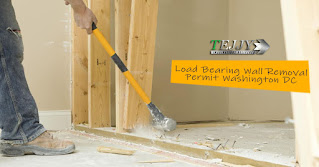Are
you about to knock down your load-bearing wall in Washington DC? Well, you
should require a permit for your load bearing wall removal in DC. This is
simply because it makes an impact on the building structure, and you’ll need an
authorization before continuing with the construction project. High costs &
delay in schedule can tempt you for removing your load-bearing wall without a
permit. However, before you make the mistake, you should weigh up the long-term
risks.
1. Provide Proper Temporary Supports:
Remember
that the load-bearing wall that you want
to eliminate is acting as a support to the above structure, like an additional
wall, floor, or roof. So, if you want to get rid of the load-bearing wall
without effective temporary shoring, the structural elements above would be uncorroborated,
and the structure will be placed at the risk of perpetual damage. You will need
to bring an apt provisional support, or shoring, to ensure that the area is
supported during removal of the prevailing load-bearing wall and installation
of perpetual structural supports.
The
simple provisional supports are integrated brace walls created corresponding to
the wall you’re removing. A contractor can construct the temporary shoring
system by making use of the typical stud wall construction, and fixing the top
and bottom plates to the joists. If the wall you’re eradicating reposes on top
of an additional load-bearing wall, your contractor can also build a subsidiary
support contiguous to the wall for continuing the load path.
Setting
up and eliminating provisional supports is an inexpensive way to avoid
accidents and hassles during construction. So, you should ensure your
contractor plan for fixing temporary shoring, by including in the construction
bid.
2. Install Permanent Structural Supports:
After
eliminating a load-bearing wall, new perpetual structural supports should be
installed in the right place. Your choices for the new structural supports
depend to a great extent on the aesthetic you like to achieve. However, all
should be considered by a certified proficient engineer for ensuring they can
support the load. If you’re fine
with a beam protruding underneath the ceiling, you can save your time and
money. You can install the new beam easily under the prevailing joists without
major cost but may project below the ceiling level.
You
also have the choice to connect your new beam flush with the ceiling. For
making it work, the present joists can be attached to the new beam with
hangers, instead of placing them on top and bearing on the beam. This entails
your living space to be smoother and open. The beam needs to be sized and
recommended for hiring a licensed professional engineer to execute the service.
Seldom, the beam may project under the ceiling, where manufactured wood,
structural steel, or added structural supports can be chosen for reducing the
beam’s size and ensuring a flat completed ceiling; though the options usually
come at a greater cost.
Engineers
can provide choices on various sizes and material provisions. Often the new
beam will be a large lumber member, or a smaller, stronger, and expensive
manufactured wood member, like laminated veneer lumber. In case you are
completing a new beam with drywall, its presence shouldn’t upset your judgment.
3. Inspect MEP Services Inside the Wall
Once
your engineers have developed new supports, you should look to it whether mechanical, electrical &
plumbing (MEP) services
are hidden within. Their presence can obscure your project and add to your
project budget. You can probably find this information in the original
construction sketches of your house. If you don’t have access to the drawings
but suspect that the MEP services may run through a wall, you should appoint a
proficient licensed professional for performing an assessment.
If
the wall you’re eliminating plumbing & mechanical ducts or electrical
wires, a contractor should reroute them into the neighboring walls. In that
context, you would need separate permits for associated electrical, plumbing,
and mechanical work.
Weigh
up these considerations for Load Bearing Wall Removal Permit in Washington DC.
Tejjy Inc. – a competent permit service company in Washington DC can help to
make your permit application
approved by DCRA.
Permits and inspections during construction can be overwhelming. The expert
permit facilitators of Tejjy Inc. understand the remodeling need of a
construction project and facilitate several load-bearing wall removals. The
expert engineers at Tejjy Inc. can gauge your situation and recommend a lucrative
design that provides you the desired aesthetic. The permit facilitators also
connect with top BIM (Building Information
Modeling) professionals in the USA
who can help in the rerouting of services and the removal of harmful resources.
If
you want to start your project, approve your permit
application with Tejjy Inc.
Call at 202-465-4830 or email at info@tejjy.com for a free consultation &
quote.

Post a Comment